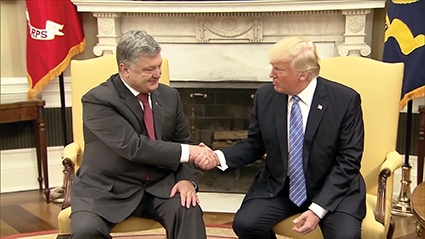Ukraine as an Insoluble Problem
Ukraine’s president Petro Poroshenko met his US counterpart, Donald Trump, on June 20 in Washington in what was their first one-on-one meeting since Trump’s election and which saw Poroshenko hailing US-Ukraine relations. Later, the White House released a statement saying that the two leaders had discussed "support for the peaceful resolution of the conflict in eastern Ukraine and President Poroshenko's reform agenda and anticorruption efforts”.
Another interesting aspect to the meeting is that Poroshenko met with Trump before the latter’s expected first encounter with Russian President Vladimir Putin during the G20 summit in Germany next month. Putin and Trump are very likely to talk about a whole of range of topics, but the Ukraine crisis is sure to be one of the focal points.
Indeed, Ukraine remains a sore point between Moscow and Washington due to Russian military and economic support of eastern Ukraine’s breakaway territories. As a reflection of this trend, just before Poroshenko’s visit, the US Treasury Department announced new sanctions against dozens of separatist fighters, leaders, and their allies who have been fighting Ukrainian forces in the eastern Donbas region.
While new sanctions are being introduced against Russia, the new US administration has yet to formulate its policy towards the conflict in east Ukraine, nor has it said how far it will go in countering Russia. Recent years have also shown that Russian and US interests are highly divergent in the region, with both pursuing their own geopolitical goals. For Russia, Ukraine is important both economically and strategically: even without Poland or the Baltic States, Russia retains the status of a “Eurasian Empire”. Without Ukraine, Russia will increasingly become a state with more borders in Asia than in Europe. This will in turn make Russia more heavily involved in long-term Islamic conflicts along its entire southern border. With an overall sharp decline in population numbers, there has been a drastic surge in past years in Russia’s Muslim population. It may have seemed like a natural internal population development in Western Europe and the US, however, for the Russian government it represents a grave problem resulting in an acute nationalist reaction in Russian society. It is exactly for this reason that the 45 million Slavs of Ukraine are crucial for Moscow. Moreover, although there have already been several examples of Slavic countries (Slovenia, Poland, Czech Republic, etc.) joining the EU and NATO, Ukraine following their path will irreversibly undermine the notion of the so-called “Slavic Union” and would leave Russia with just its Belarus brethren.
Europe is on a desperate quest for security, but the same can be said about Russia. Ukraine within the EU and NATO, with ultra-modern Western forces and military capabilities, stationed on the Russian-Ukrainian border, will automatically create existential problems for Russia. From a pro-European/NATO Kiev, it will be possible to have effective influence not only on the North Caucasus but also Belarus, whose territory is used by Russian armed forces and thereby constitutes a major threat to Poland because of the long border the latter has with Belarus.
For the US, keeping Ukraine is a strategic imperative as it tries to prevent the resurgent Russia from projecting its influence in its immediate neighborhood. Restoration of Russian influence over the Ukraine territory would increase Moscow’s projection of power over the Black Sea and the South Caucasus, and will threaten eastern European security. Thus, from a strategic point of view, financial aid together with, for the moment, measured military assistance, are those steps the US would continue with.
This shows those crucial differences between the two powers in the post-Soviet space and offers little chance for them to reconcile. Any change in US attitude towards Ukraine would prompt a fracture in the united Western front against Russia and a decrease of western prestige in such important countries as Georgia and Moldova.
Although it is tempting at times to claim that the US will change its policy towards the Ukraine conflict or will recognize Crimea as a part of Russia, there is a range of strategic differences between Moscow and Washington. East European security, together with the increased Russian influence in the post-Soviet space, are at stake- making it difficult for the White House to change its course on Ukraine.
Emil Avdaliani












